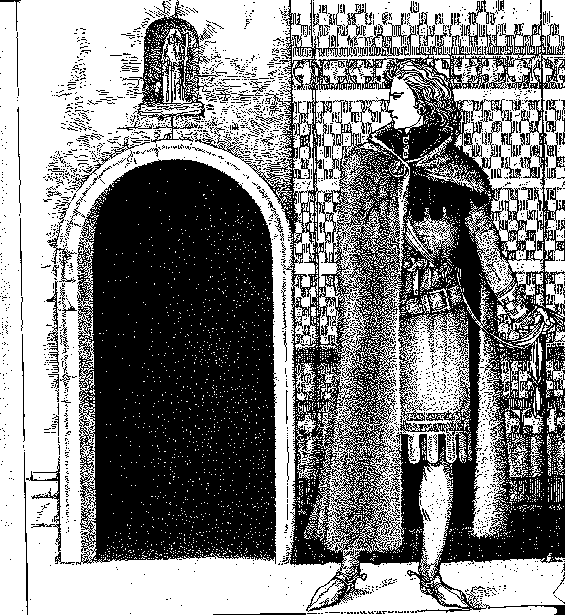 The story, Sir Gawain and the Green Knight, was told in the14th century by an anonymous poet about a young knight on his first adventure. In my analysis of Part 4, lines 2358 through 2350, I will discuss the significance of the number three, the tap, the asking of the Green Knight his name, and the green belt. I will develop the theory that the author uses this story and these significant symbols to bring out his Christian beliefs about the flesh and its weakness.
The story, Sir Gawain and the Green Knight, was told in the14th century by an anonymous poet about a young knight on his first adventure. In my analysis of Part 4, lines 2358 through 2350, I will discuss the significance of the number three, the tap, the asking of the Green Knight his name, and the green belt. I will develop the theory that the author uses this story and these significant symbols to bring out his Christian beliefs about the flesh and its weakness.The passage opens with the Green Knight explaining why he has not struck Gawain the first two times because Gawain has kept the agreements. The agreement is that whatever the Green Knight wins in the woods, he will exchange with Sir Gawain for his earning in the castle at the end of each day. The Green Knight explains that the reason that Gawain is tapped is because the third time he withheld a part of his earnings for the day (the green belt). The Green Knight swings two times, stopping short; on the third time, he taps Gawain, scarring him but not chopping off his head.
There is great significance in the fact that the events in this poem occur in multiples of three. Three times Gawain is tempted by the lovely lady, and on the third time, he succumbs to her temptations, by accepting the green belt. The hunts take place on three different days. The third day, Gawain withholds a portion of his earnings. The Green Knight swings at Gawain three times. He purposely misses the first two times. On the third time he taps him, leaving a scar. The significance of all these threes is that Christianity teaches the trilogy: the Father, the Son, the Holy Ghost. Almost everything in life falls into groups threes: man, women, child; three trimesters to the birth of a child; the Sun, Moon and the Earth. The fact that the events unfold in counts of threes explains the depth with which the anonymous poet was trying to connect this story and this passage to the bible and biblical events.
The tap represents Gawain's punishment for not exchanging his earnings. He is tapped instead of his head being chopped off because the Green Knight acknowledges the fact that he has told his wife, the lovely lady, to tempt Gawain and he understands why Gawain does not give up the green belt. Though the Green Knight understands, Gawain is scared, his penance, so he will always remember this lesson. This is also significant when relating this to Christianity. In Christianity, symbols are constantly used throughout the bible as reminders of sins, mistakes and compromises of God's laws.
After the Green Knight explains the events that have taken place, the reason why he taps Gawain, and the role that the lovely lady has played, Gawain becomes filled with shame. He also confesses that the cut has taught him cowardliness. The Green Knight corrects him , by telling him that since he has confessed and realized his sin and felt the penance of the point of his blade, he is forgiven. He is also told to take the green belt as a reminder of the meeting. Gawain says he will use the belt as more than just a reminder of their meeting, but also as a reminder that the flesh is weak. It is at this point that he asks the Green Knight his name.
The significance of Gawain asking the Green Knight his name at this particular point in the story and passage is that now he is humbled and has gained respect for the Green Knight. If we were to place the asking of the Green Knight his name in a Christian context, what we would see is that when Adam and Eve were in the Garden of Eden, they had no knowledge of the fact that they were naked, until they ate of the apple. It was then, they asked why they were naked and felt the shame of it. It wasn't until Gawain felt the shame of the tap that he decides to ask the Green Knight his name.
When Gawain returns to Camelot, he tells of his adventure and shows his scar and green belt. King Arthur is so taken by this tale that he tells all the lords and ladies of the court to wear a green belt as a reminder of their sins. The significance of the green belt is that it represents a sign of his sins and the weakness of the flesh. This can be correlated to Christianity, where the cross is recognized as a symbol of our sins that Jesus died for. This symbol is seen in churches, on necks, and as a constant reminder of what Jesus sacrificed, just as the green belt signifies Gawain's fall from perfection.
In conclusion, I feel that the author used this story and specifically this passage as a way to teach aspects of Christianity, without blatantly coming out and stating that he is teaching Christianity. Throughout the story and especially in this passage, we have many references to things that relate to the Bible: the number three, the tap, the asking of the Green Knight his name, the green belt.
No comments:
Post a Comment